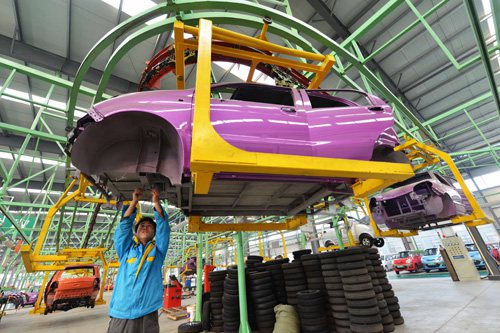|
 |
|
NEW ENERGY VEHICLE: A worker assembles an electric vehicle at Shandong Wido New Energy Automobile in Zouping County, Shandong Province, on October 27 (DONG NAIDE) |
Tax Breaks
Enterprises involved in government-led shantytown renovation are eligible for tax breaks if they meet certain conditions, authorities announced on October 28 in an effort to encourage participation in the project.
Renovation expenditure would be deducted from the taxes paid by enterprises engaged in government-organized redevelopment of remote mining and forestry areas short of public infrastructure, according to a circular released by the Ministry of Finance and the State Administration of Taxation.
The circular also specified other requirements for the tax break, including the number of households in the shantytowns and the state of such areas. The policy will be retroactive to January 1, 2013.
Shantytown renovations are a crucial part of China's efforts to provide low-income urban residents with affordable accommodations.
Monopoly Fined
A court in south China's Guangdong Province has ordered U.S. firm InterDigital Communications (IDC) to pay local technology giant Huawei 20 million yuan ($3.26 million) in compensation for monopolistic practices.
In its final verdict on October 28, the Guangdong Provincial Higher People's Court upheld the previous verdict issued by the municipal intermediate people's court of Shenzhen, where Huawei is headquartered.
Patent prices offered to Huawei by IDC have often been hundreds of times higher than to other companies, according to the court. Asking for a higher price from Huawei is neither fair nor reasonable as its cellphone sales volume is far less than that of Apple and Samsung, the court stated.
The U.S. International Trade Commission initiated a Section 337 investigation into Huawei's 3G and 4G wireless devices on January 31 for patent infringement. IDC, a wireless technology patent giant, was actively pushing forward the investigation.
According to the court, it was legitimate for the case to be heard in China as Huawei's manufacturing is based in the country and IDC's monopoly in U.S. markets and patent authorization could directly affect Huawei's production in China as well as its exports.
Huawei sued IDC over its abuse of market monopoly on December 6, 2011 and asked for compensation worth 20 million yuan ($3.26 million). Both parties appealed to the court after its first verdict was reached. | 